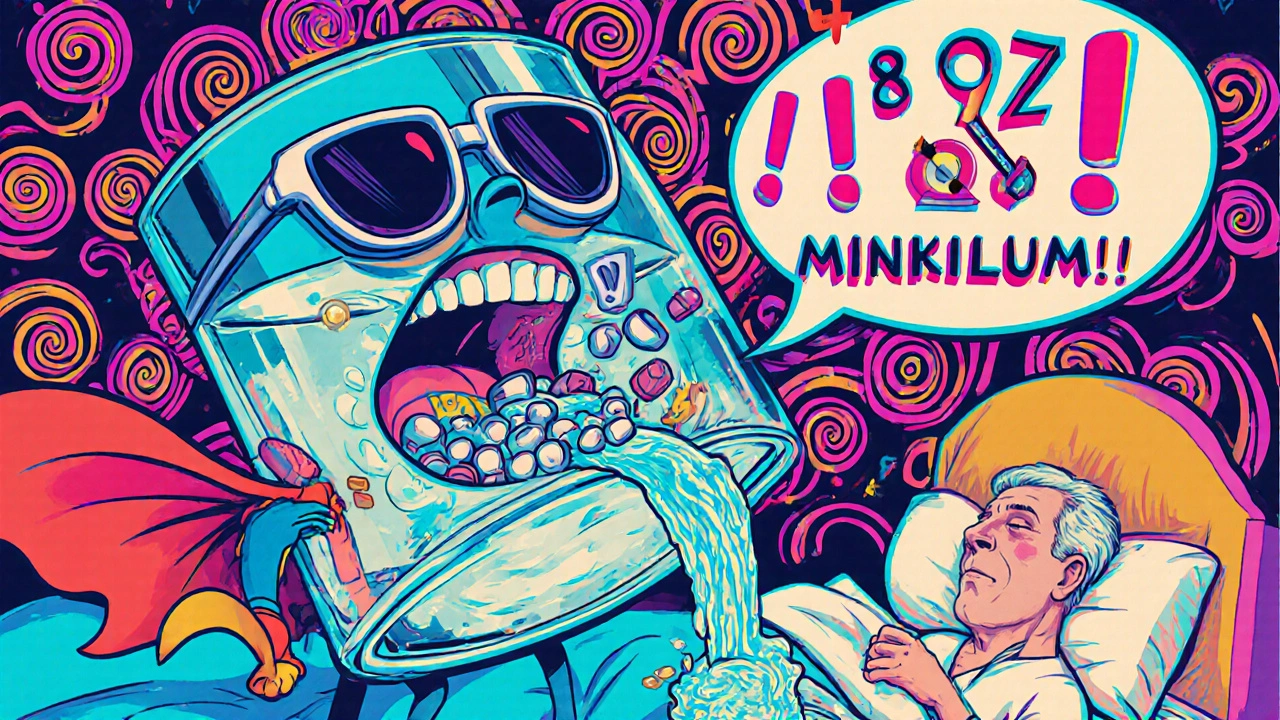Medication-Fiber Timing Calculator
Your Medication Schedule
Fiber Supplement Details
Constipation is one of the most common digestive complaints, and fiber supplements like psyllium (found in Metamucil) are often the first thing doctors recommend. But here’s the catch: if you’re taking any regular medications, taking fiber at the wrong time can make your pills less effective-or even dangerous.
Why Fiber Interferes With Medications
Fiber supplements, especially those made from psyllium husk, don’t just add bulk to your stool. When they hit your stomach and intestines, they absorb water and turn into a thick, gel-like substance. That’s great for softening stools and easing constipation. But that same gel can also trap medications as they move through your gut, stopping them from being properly absorbed. This isn’t theoretical. Studies show that fiber can reduce how much of your drug enters your bloodstream. For example, people taking metformin for diabetes have reported higher blood sugar levels when they took their fiber supplement at the same time. The same goes for lithium (used for bipolar disorder), carbamazepine (for seizures), and olanzapine (for schizophrenia). In each case, the fiber physically blocked the drug from being absorbed the way it should. The American Gastroenterological Association confirmed this in their 2023 review: fiber alters how fast your stomach empties and how quickly things move through your intestines. That changes the window when your body can absorb medication. If you take your pill and your fiber together, you’re essentially putting a blanket over your medicine.What the Experts Say About Timing
There’s no single rule that fits everyone, but the safest and most consistent advice across medical sources is this: take fiber supplements at least 2 hours before or after your medications. Metamucil’s official instructions are clear: “Bulk-forming fibers like psyllium husk may affect how well medicines work. Take this product at least 2 hours before or after medicines.” That’s not a suggestion-it’s a warning. And it’s backed by clinical data. Some sources suggest slightly different windows. Nature Made recommends taking fiber before bed if you take meds in the morning, or vice versa. SAMPA Docs says afternoon or evening is ideal if your pills are taken in the morning. But here’s the problem: FreeRx and multiple patient forums report that taking fiber at night causes bloating, gas, and abdominal cramps that disrupt sleep. In fact, 82% of users who switched from nighttime to morning fiber saw better sleep and fewer digestive issues. So what’s the best compromise? Take fiber in the morning-about 2 hours before your first medication. If your meds are taken at night, take fiber after lunch or early afternoon. That gives you a solid 4-hour buffer before bedtime meds.How Much Fiber Should You Take?
Not all fiber is created equal. Psyllium husk is the most studied and effective type for constipation. Doses below 10 grams per day often don’t work. The sweet spot? 10-30 grams daily, split into 2-3 doses. Metamucil’s standard serving (one teaspoon or one wafer) gives you 5 grams of total fiber-3 grams insoluble, 2 grams soluble. That means you need at least two servings per day to hit the minimum effective dose. For heart health or blood sugar control, you might need up to five capsules, four times a day-always with food and plenty of water. Start low. If you’ve never taken fiber supplements before, begin with one serving a day. Increase slowly over 1-2 weeks. Jumping straight to 30 grams can cause bloating, gas, and even worse constipation. Your gut needs time to adjust.
Water Is Non-Negotiable
You can’t skip this. Fiber needs water to work. Without enough liquid, it swells up and can get stuck-in your throat, esophagus, or intestines. That’s not just uncomfortable. It’s dangerous. Metamucil’s label says: “Take with at least 8 fluid ounces (237 mL) of liquid.” That’s one full glass. Don’t just sip. Drink it all at once. For older adults or anyone with swallowing issues, this is especially critical. A 2024 study in the Journal of Geriatric Gastroenterology found that 1 in 5 cases of esophageal obstruction from fiber supplements occurred in people over 65 who took them with just a sip of water. Always drink water before, during, and after your fiber dose. If you’re taking it in capsule form, swallow them one at a time with a full glass of water. Don’t toss them back like candy.When to Stop Taking Fiber
Fiber isn’t harmless. If you start feeling abdominal pain, nausea, vomiting, or if your constipation lasts more than 7 days despite taking fiber, stop immediately. These aren’t normal side effects-they’re red flags. UCSF Health advises patients to seek medical help if they experience rectal bleeding or sudden changes in bowel habits lasting two weeks. These could signal diverticulitis, bowel obstruction, or even colon cancer. Fiber can mask symptoms, making diagnosis harder. Also, if you have diverticulitis (inflamed pouches in the colon), you may need to cut fiber during flare-ups. It sounds backwards-fiber prevents diverticulitis, but during active inflammation, it can irritate the area. Always check with your doctor if you have a history of this condition.Real People, Real Results
On Reddit’s r/medication community, 67% of 142 respondents said their meds didn’t work as well when taken with fiber. Nearly half mentioned metformin specifically. One user wrote: “My A1C jumped from 6.8 to 8.1 after I started Metamucil. I didn’t realize the timing was off until I spaced them out-now my levels are back to normal.” On SAMPA Docs’ patient portal, 72% of users who reported success with fiber and medication timing said they took fiber and pills at opposite ends of the day. Morning fiber with evening meds, or evening fiber with morning meds. The key? Consistency. A 2023 review of Nature Made customer reviews showed a clear pattern: supplements taken 20-30 minutes before meals got a 4.2/5 rating. Those taken before bed? Only 3.1/5. The most common complaint? “Woke up at 3 a.m. with cramps and had to run to the bathroom.”
What’s Next for Fiber Supplements?
Researchers are working on solutions. The European Medicines Agency flagged time-release fiber matrices as a “high-potential innovation” in 2024. These new formulations would slowly release fiber over several hours, reducing the chance of drug interference. Clinical trials (NCT05678901) are currently testing whether late-morning dosing gives the best balance of relief and minimal interaction. Meanwhile, the FDA has started cracking down. In November 2023, they issued warning letters to three supplement makers for making false claims about medication safety. No more saying “safe to take with all drugs.” That’s not true. And companies can’t pretend it is.Simple Rules to Follow
Here’s what you actually need to remember:- Take fiber at least 2 hours before or after any medication.
- Prefer morning fiber if your meds are taken at night.
- Avoid taking fiber before bed-it causes sleep-disrupting bloating.
- Always drink a full glass of water (8 oz / 237 mL) with every dose.
- Start with one serving per day and increase slowly.
- Stop and call your doctor if you have pain, bleeding, or constipation lasting more than 7 days.
Who Should Avoid Fiber Supplements?
Not everyone should use them. Avoid fiber supplements if you have:- A known bowel obstruction or narrowing of the intestines
- Severe abdominal pain with no known cause
- Difficulty swallowing (especially if you’re elderly)
- Active diverticulitis flare-up
- Allergy to psyllium or any ingredient in the supplement
Fiber supplements work. They’re not magic, but they’re one of the most effective, low-cost ways to manage constipation. But like any tool, they need to be used right. Get the timing wrong, and you risk your meds failing-or worse. Get it right, and you’ll feel better, without compromising your treatment.
Can I take fiber supplements with my morning medications?
No, not if you take them at the same time. Fiber can bind to medications and reduce absorption. Wait at least 2 hours after taking your meds before taking fiber. If your meds are in the morning, take fiber in the late afternoon or evening instead.
Is it safe to take fiber before bed?
It’s not recommended. Taking fiber at night often causes bloating, gas, and cramps that can wake you up. Many users report midnight bathroom trips and poor sleep. Morning or afternoon dosing is more effective and better tolerated.
Which fiber supplement is best for constipation?
Psyllium husk (like Metamucil) is the most effective. It’s been proven in clinical trials to increase bowel movements by about 3 per week. Other types like methylcellulose or calcium polycarbophil are gentler but less effective for hard stools.
How long does it take for fiber to work for constipation?
Most people notice improvement in 1-3 days, but full results take 2-4 weeks. Don’t give up too soon. Studies show you need at least 4 weeks of daily use (10+ grams) to see consistent benefits. Start slow to avoid bloating.
Can fiber supplements help with other conditions besides constipation?
Yes. Psyllium is FDA-approved to help lower cholesterol when taken at 7 grams per day. It also helps stabilize blood sugar after meals, which is why some diabetics use it. But always check with your doctor-dosing for heart health or blood sugar is different than for constipation.
What if I forget to time my fiber and meds correctly?
If you accidentally take them together, don’t panic. One mistake won’t ruin your treatment. But don’t make it a habit. If you’re on critical meds like lithium, metformin, or seizure drugs, even one poorly timed dose could affect your health. Set phone reminders or use a pill organizer with labeled compartments for meds and fiber.
Does insurance cover fiber supplements?
Most U.S. insurance plans don’t cover fiber supplements because they’re sold over-the-counter. But if your doctor prescribes them for a condition like IBS-C, Medicare Part D may cover them. Check with your plan. Even without coverage, generic psyllium costs less than $10 a month.







David Cunningham
November 23, 2025 AT 16:36Man, I took Metamucil with my metformin for months and wondered why my sugar was all over the place. Turns out I was basically giving my pills a bath in glue. Dumb move. Started spacing them out like the article said-morning fiber, night meds-and boom, my A1C dropped like it owed me money. Why do we all assume supplements are harmless? 🤦♂️
Patrick Marsh
November 25, 2025 AT 03:01Two hours. Not one. Not 90 minutes. Two. Full hours. That’s the rule. No exceptions. Water. Always water. Don’t be the guy who chokes on psyllium.
New Yorkers
November 25, 2025 AT 14:22Oh, so now we’re treating fiber like it’s a pharmaceutical-grade toxin? I mean, sure, it’s a gelatinous swamp monster in your gut-but it’s also nature’s broom. The real tragedy here isn’t the timing-it’s that people still think a $10 powder can replace a lifestyle. You’re not fixing constipation with psyllium-you’re masking a diet of twinkies and regret. Wake up. Eat vegetables. Move. Stop outsourcing your biology to a jar.
Julie Pulvino
November 27, 2025 AT 09:22I used to take fiber at night because it seemed ‘natural’-like my body would ‘cleanse’ while I slept. Then I started waking up at 3 a.m. feeling like a balloon full of soda. I switched to afternoon fiber (after lunch, before meds) and suddenly I could sleep through the night AND my digestion felt smoother. Also, the water thing? Non-negotiable. I keep a giant bottle on my desk now. No more sipping. Full gulp. Every time.
Danny Nicholls
November 28, 2025 AT 14:52Just started psyllium last week and honestly? My gut’s been chillin’ 😌 I was scared of bloating but took it slow-1 tsp day 1, then 2 tsp day 3. Water? I’m drinking like I’m training for a marathon 💧 My doc said I’m doing it right. Also, if you’re on meds, set a phone alarm for fiber and meds. I have two: ‘FIBER TIME’ and ‘MEDS TIME’ 📱✨ #lifehack
Robin Johnson
November 29, 2025 AT 14:46If you’re on lithium, carbamazepine, or olanzapine, you’re not just risking reduced efficacy-you’re risking hospitalization. This isn’t ‘maybe you should.’ This is ‘your brain might stop working if you ignore this.’ Don’t gamble with your mental health. Two hours. No exceptions. Write it on your bathroom mirror. Print it. Tape it to your pill organizer. Do it.
Latonya Elarms-Radford
December 1, 2025 AT 05:32It’s not just about timing-it’s about the metaphysics of digestion. Fiber, in its gelatinous glory, is the silent monk of the gastrointestinal tract, meditating in the bowels, absorbing not just water but the very essence of pharmaceutical intention. We live in an age where we treat our bodies like vending machines-insert pill, expect result-but the body is not a machine. It is a sacred, chaotic symphony. And when you shove psyllium into that symphony without reverence, you disrupt the harmony. The ancients knew: digestion was ritual. Now? We swallow capsules like candy and wonder why our souls feel constipated too.
luke young
December 2, 2025 AT 04:02Thanks for this. I’ve been taking fiber at night because I thought it’d help me ‘cleanse’ overnight. Now I know why I was waking up in pain. I’m switching to after lunch tomorrow. And yes-I’m finally buying a bigger water bottle. 😅